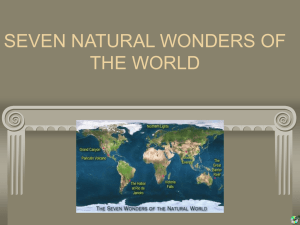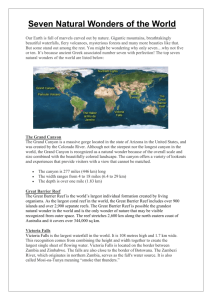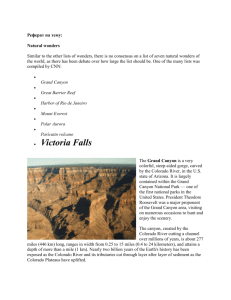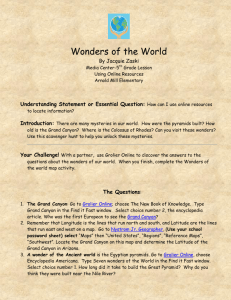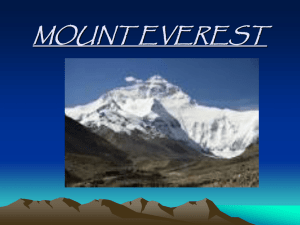Seven Natural Wonders 2
advertisement
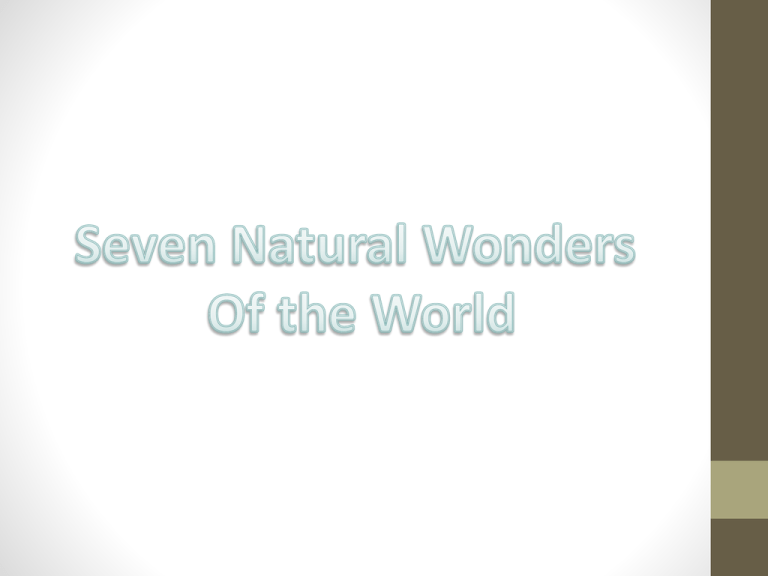
In Southern Africa, the Zambezi river flows across a flat plateau that extends hundreds of miles in all directions. It is here that one will find the largest waterfall in the world. The falls drop into a deep groove which is connected to a long series of gorges. This unique form allows the falls to be viewed about 196 feet away from the opposite side of the gorges. Gorge- deep canyon Victoria Falls is one of the seven wonders of the world, stretching about 1 mile wide and shared by the countries of Zambia and Zimbabwe. During the wet season, the spray from the falls can be seen nearly 30 miles away, which gives the name Mosi-oa-Tunya (the ‘Smoke that Thunders’). Northern Lights - Aurora Borealis Aurora Borealis, another one of the natural wonders of the world, appears in the North sky and is visible only from the Northern Hemisphere. These northern polar lights appear from September to October and March to April. The Aurora Borealis is named after the Roman goddess of dawn, Aurora and the Greek name for the north wind, Boreas. Often seen as a greenish glow or occasionally a faint red, the lights consist of solar wind and particles that appear as “curtains” or streamers extending in an east-west direction across the sky. Shaped by the earth’s magnetic field, the lights are constantly changing and evolving. The Cree (a Native American Tribe) call this phenomenon the “Dance of the Spirits.” Grand Canyon The Grand Canyon is located in North America and goes for about 249 miles through the Colorado Plateau in northwest Arizona. The canyon is 3.7 to 18.6 miles wide and about 1 mile deep. The Grand Canyon is an erosion formed by water, ice and wind and is considered one of the 7 wonders of the world. The layers of sedimentary rock were formed over millions of years ago and provide detailed insight into the timeline of the earth’s formation. Paricutin Volcano In 1943 the Parîcutin Volcano erupted in Michoacán, Mexico. The first man to witness the eruption was an Indian farmer, named Dominic Pulido. The Parîcutin is a Monogenetic cone, which means it has a single point of eruption. The volcano now stands at .25 (1/4) miles above ground. Its hardened lava covers about .01 square miles and its volcanic sand covers about .02 square miles. It is named after a small Tarascan Indian village and is now counted as one of the Seven Wonders of the World. Harbour of Rio de Janiero The Harbour of Rio de Janeiro in Brazil is one of the 7 wonders of the world because it holds many illusions. The Harbour can be viewed in so many ways that it appears differently and can be deceptive. For example, the mountains create an entrance into the bay and can make it appear to be a lake. However, when the Portugese explorers arrived in 1502, they believed the bay was a large river and named it Rio de Janeiro, the “River of January,” in honor of the month they arrived. Mount Everest On the edge of the Tibetan Plateau stands one of the most impressive of the 7 world wonders, Mount Everest. Like the rest of the Himalayas, Mount Everest rose from the floor of the ancient Tethys Sea. Mount Everest is considered to be the highest mountain in the world and continues to grow today at the rate of a few millimeters each year. Mount Everest and the Himalayas were traditionally respected by the local people as the homes of the gods and were considered sacred. Great Barrier Reef The last of the 7 wonders of the world is the Great Barrier Reef along the northeast coast of Queensland, Australia. The Great Barrier Reef stretches about 1615 miles and is the world’s largest coral reef ecosystem composed of 2,900 individual reefs. The Great Barrier Reef supports a variety of species that are open to attack and many of them are endangered species. The Great Barrier Reef covers an area of approximately 213 square miles and is the only living organism on Earth that is visible from space. Information in this PowerPoint was taken from the following website. http://www.victoriafalls-guide.net/7-wonders-of-the-world.html
